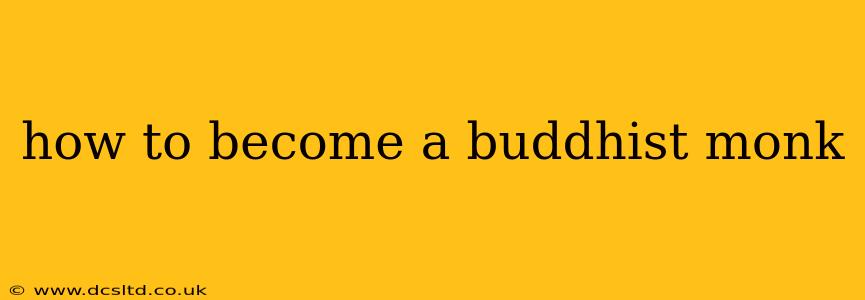Becoming a Buddhist monk is a profound commitment, a journey of self-discovery and spiritual growth demanding dedication, discipline, and a deep understanding of Buddhist principles. This path is not taken lightly; it requires careful consideration and preparation. This guide explores the process, addressing common questions and providing insights into what to expect.
What are the Different Types of Buddhist Monastic Orders?
Buddhist monasticism varies significantly across different traditions. There's no single, universal path. The primary branches, Theravada and Mahayana, have distinct monastic practices and structures. Within these branches, further variations exist based on specific schools and lineages.
-
Theravada Buddhism: Emphasizes individual practice and the attainment of enlightenment through personal effort. Monastic life is often characterized by a strict adherence to the Vinaya (monastic code of conduct), rigorous meditation practice, and a life dedicated to study and self-improvement.
-
Mahayana Buddhism: Emphasizes the Bodhisattva ideal – the dedication to achieving enlightenment for the benefit of all beings. Monastic life within Mahayana traditions can be quite diverse, with some orders following stricter rules than others. Some Mahayana monks actively engage in social work and community engagement.
Understanding these differences is crucial in choosing a path that aligns with your personal beliefs and aspirations.
What are the Requirements to Become a Buddhist Monk?
Requirements vary widely depending on the tradition and specific monastery. However, some common themes emerge:
-
Age: Most traditions require a minimum age, typically 18 or 20, though exceptions can exist.
-
Health: Good physical and mental health is generally expected to handle the demands of monastic life.
-
Commitment: A deep and sincere commitment to Buddhist principles and the monastic lifestyle is essential. This requires introspection and a clear understanding of the sacrifices involved.
-
Sponsorship: Some monasteries require sponsorship or recommendation from an existing monk or member of the community.
-
Education: While not universally required, some monasteries prefer candidates with a foundational understanding of Buddhist teachings.
How Long Does it Take to Become a Buddhist Monk?
There's no fixed timeframe. The process involves a period of training and probation, varying in length across traditions and monasteries. It could range from several months to several years before full ordination. The initial period often involves learning basic monastic practices, rules, and Buddhist philosophy.
What is the Daily Life of a Buddhist Monk Like?
Daily life for a Buddhist monk revolves around a structured routine focused on spiritual practice. This typically includes:
-
Meditation: Extensive periods of meditation are central to the daily schedule.
-
Study: Study of Buddhist scriptures and teachings is essential for deepening understanding and practice.
-
Chanting: Reciting sutras and mantras is a common part of daily practice.
-
Manual Labor: Many monasteries require monks to participate in manual labor, contributing to the upkeep of the monastery and fostering self-reliance.
-
Community Life: Living in a community of monks involves shared responsibilities and mutual support.
Do Buddhist Monks Take Vows?
Yes, Buddhist monks take vows of various kinds, the specifics depending on the tradition and ordination level. Common vows include:
-
Celibacy: Abstaining from sexual activity.
-
Non-violence (Ahimsa): Refraining from harming any living being.
-
Non-stealing: Honesty and integrity in all dealings.
-
Truthfulness: Speaking truthfully and avoiding gossip or deception.
What are the Challenges of Being a Buddhist Monk?
Monastic life presents significant challenges:
-
Isolation: Separation from family and friends can be difficult.
-
Discipline: Adhering to a strict daily routine and vows requires strong discipline.
-
Poverty: Monks often live a life of simplicity and may experience material limitations.
-
Spiritual Struggle: The path to enlightenment involves facing inner challenges and overcoming mental obstacles.
How Can I Find a Buddhist Monastery?
Research different Buddhist traditions and monasteries that align with your values and preferences. Many monasteries have websites providing information about their practices and requirements. Contacting a monastery directly is the best way to learn about their specific requirements and application process.
Becoming a Buddhist monk is a transformative journey requiring significant commitment and self-reflection. It's crucial to approach this path with careful consideration, thorough research, and a deep understanding of the responsibilities involved. Remember to seek guidance from experienced monks and teachers throughout the process.
